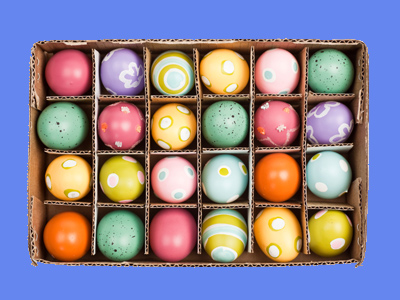
Ask the AI Tutor
Need help with Year 2 Calculation - Multiplication in any Order? Ask our AI Tutor!
AI Tutor - Lucy
Connecting with Tutor...
Please wait while we establish connection

6 x 4 = 24 and 4 x 6 = 24 as well!
Year 2 Calculation - Multiplication in any Order
Discover that 2 × 5 equals 5 × 2. Use arrays and equal groups to see why order doesn’t matter and solve multiplication quickly.
Question 1
What could make this calculation easier to work out?
5 x 12
5 x 12
Quickly learning the 12 times table
Adding the two numbers together
Changing the numbers around to 12 x 5
Finding the difference between the two numbers
5 x 12 = 60 and 12 x 5 also gives the same answer
Question 2
I don't know my 7 times table yet. How could I work out 5 x 7?
By quickly learning the 7 times table
By doing 7 x 5 instead
By guessing the answer
By adding 7 and 5 together
5 x 7 = 35 and 7 x 5 is 35 too
Question 3
When you multiply two numbers...
you can multiply them in any order
you should add them first
you will get an answer of more than 50
you will also find the difference
When multiplying two numbers, it doesn't matter which way round they go, you will still get the same answer
Question 4
Which of the following pairs give an answer of 20?
20 x 2 and 2 x 20
4 x 5 and 5 x 4
10 x 4 and 4 x 10
10 x 20 and 20 x 10
4 x 5 = 20, as does 5 x 4
Question 5
Which of the following pairs give an answer of 60?
60 x 2 and 2 x 60
30 x 2 and 2 x 30
15 x 3 and 3 x 15
40 x 4 and 4 x 40
2 x 30 gives an answer of 60, as does 30 x 2
Question 6
What is 100 x 4?
410
40
104
400
Changing the order of the numbers makes this 4 x 100, which is easier to work out
Question 7
Which number is missing?
20 x ? = 80
20 x ? = 80
60
40
24
4
4 x 20 = 80 and 20 x 4 = 80 too
Question 8
Which number is missing?
? x 8 = 16
? x 8 = 16
4
24
12
2
If you know that 8 x 2 = 16, then 2 x 8 = 16 also
Question 9
What is 50 x 2?
52
100
25
70
2 x 50 is much easier to work out!
Question 10
5 x 6 gives the same answer as...
40 x 5
4 x 50
5 + 4
6 x 5
They both give an answer of 30
**Unlimited Quizzes Await You! 🚀**
Hey there, quiz champ! 🌟 You've already tackled today's free questions.
Ready for more?
Ready for more?
🔓 Unlock UNLIMITED Quizzes and challenge yourself every day. But that's
not all...
not all...
🔥 As a Subscriber you can join our thrilling "Daily Streak" against other
quizzers. Try to win a coveted spot on our Hall of Fame Page.
quizzers. Try to win a coveted spot on our Hall of Fame Page.
Don't miss out! Join us now and keep the fun rolling. 🎉
**Unlimited Quizzes Await You! 🚀**
Hey there, quiz champ! 🌟 You've already tackled today's free questions. Ready for more?
🔓 Unlock UNLIMITED Quizzes and challenge yourself every day. But that's not all...
🔥 As a Subscriber you can join our thrilling "Daily Streak" against other quizzers. Try to win a coveted spot on our Hall of Fame Page.
Don't miss out! Join us now and keep the fun rolling. 🎉






